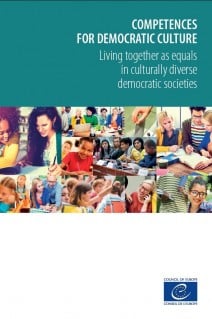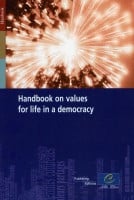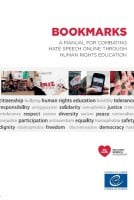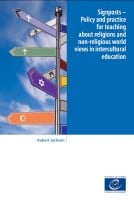



A new Council of Europe reference framework of competences for democratic culture!
Contemporary societies within Europe face many challenges, including declining levels of voter turnout in elections, increased distrust of politicians, high levels of hate crime, intolerance and prejudice towards minority ethnic and religious groups, and increasing levels of support for violent extremism. These challenges threaten the legitimacy of democratic institutions and peaceful co-existence within Europe.
Formal education is a vital tool that can be used to tackle these challenges. Appropriate educational input and practices can boost democratic engagement, reduce intolerance and prejudice, and decrease support for violent extremism. However, to achieve these goals, educationists need a clear understanding of the democratic competences that should be targeted by the curriculum.
This book presents a new conceptual model of the competences which citizens require to participate in democratic culture and live peacefully together with others in culturally diverse societies. The model is the product of intensive work over a two-year period, and has been strongly endorsed in an international consultation with leading educational experts. The book describes the competence model in detail, together with the methods used to develop it. The model provides a robust conceptual foundation for the future development of curricula, pedagogies and assessments in democratic citizenship and human rights education. Its application will enable educational systems to be harnessed effectively for the preparation of students for life as engaged and tolerant democratic citizens. The book forms the first component of a new Council of Europe reference framework of competences for democratic culture. It is vital reading for all educational policy makers and practitioners who work in the fields of education for democratic citizenship, human rights education and intercultural education.
Contents
ABOUT THIS DOCUMENT
PREFACE
EXECUTIVE SUMMARY
1. INTRODUCTION
2. A BACKGROUND ASSUMPTION: COMPETENCES ARE NECESSARY BUT NOT SUFFICIENT
3. A FURTHER BACKGROUND ASSUMPTION: ALL CULTURES ARE INTERNALLY HETEROGENEOUS, CONTESTED, DYNAMIC AND CONSTANTLY EVOLVING
4. THE CONCEPT OF COMPETENCE EMPLOYED IN THE CURRENT MODEL
5. THE WORKING METHOD USED TO IDENTIFY THE COMPETENCES TO BE INCLUDED IN THE MODEL
5.1. Audit of existing competence schemes
5.2. Decomposition of existing competence schemes
5.3. The identification of competences for inclusion in the model
6. THE MODEL
6.1. Values
6.2. Attitudes
6.3. Skills
6.4. Knowledge and critical understanding
7. CONCLUSION
APPENDIX A
THE SOURCES OF THE COMPETENCE SCHEMES THAT WERE AUDITED BY THE PROJECT
APPENDIX B
THE 55 POSSIBLE COMPETENCES THAT WERE IDENTIFIED ACROSS THE 101 COMPETENCE SCHEMES
APPENDIX C
SUGGESTIONS FOR FURTHER READING BEYOND THE REFERENCES LISTED IN APPENDIX A
APPENDIX D
AUTHORS AND CONTRIBUTORS
Download an extract (1000)







A new Council of Europe reference framework of competences for democratic culture!
Contemporary societies within Europe face many challenges, including declining levels of voter turnout in elections, increased distrust of politicians, high levels of hate crime, intolerance and prejudice towards minority ethnic and religious groups, and increasing levels of support for violent extremism. These challenges threaten the legitimacy of democratic institutions and peaceful co-existence within Europe.
Formal education is a vital tool that can be used to tackle these challenges. Appropriate educational input and practices can boost democratic engagement, reduce intolerance and prejudice, and decrease support for violent extremism. However, to achieve these goals, educationists need a clear understanding of the democratic competences that should be targeted by the curriculum.
This book presents a new conceptual model of the competences which citizens require to participate in democratic culture and live peacefully together with others in culturally diverse societies. The model is the product of intensive work over a two-year period, and has been strongly endorsed in an international consultation with leading educational experts. The book describes the competence model in detail, together with the methods used to develop it. The model provides a robust conceptual foundation for the future development of curricula, pedagogies and assessments in democratic citizenship and human rights education. Its application will enable educational systems to be harnessed effectively for the preparation of students for life as engaged and tolerant democratic citizens. The book forms the first component of a new Council of Europe reference framework of competences for democratic culture. It is vital reading for all educational policy makers and practitioners who work in the fields of education for democratic citizenship, human rights education and intercultural education.
Please note that in accordance with our terms & conditions, PDF/epubs may only be purchased by private individuals.
